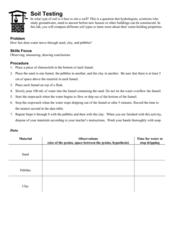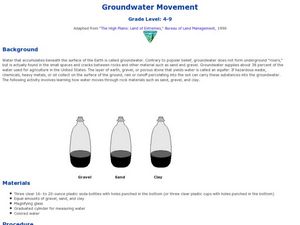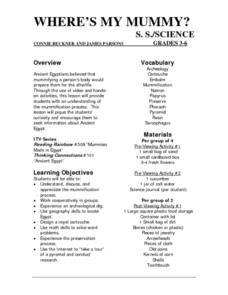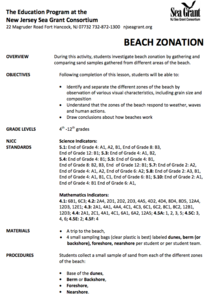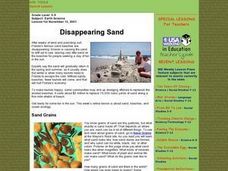Curated OER
Soil Testing
Earth science learners experiment with the water-holding properties of sand, pebbles, and clay. They apply their findings to the building of a well. This activity is engaging and tactile, and it demonstrates the importance of considering...
Scholastic
Study Jams! Soil
Seven superb slides sharpen science students' scoop on soil. In viewing them and reading the accompanying captions, your class will uncover the importance, different types, horizons, and protection of soil. They can then assess their new...
Curated OER
Sands of Time
Young scientists take a close looks a samples of sand that come from three different beaches. They use microscopes to view the three slides, and make observations on a worksheet. At the end of the instructional activity, learners share...
Curated OER
Sand Shakes & Mud Pies: Investigating Sediment
Take a field trip to a location where water and land meet to study patterns of sediment organization in wet habitats: river or ocean beaches, sand dunes, tidal marshes, the edge of a pond, or a woodland stream. Small groups collect pairs...
Curated OER
#16 Separation Science Lab
Students in this inquiry-based experiment, put in the role of a method development chemist. The scenario they are given is that a train wreck has occurred resulting in a chemical spill. Students are told that the spill mixture consists...
Curated OER
Sand Explorations
Students experiment with different samples of sand from Maui leeward and windward beaches. They create a sand map to suggest at least one contributing factor for the formation of each beach sample. They test the samples to determine...
Curated OER
Sand Travels
Learners examine how sand is formed by erosion and that it can be moved by streams, rivers, and ocean currents in this unit of lessons. They study waves and currents, and structures that change how sand moves by creating story charts,...
Curated OER
Groundwater Movement
Students study groundwater movement beneath the surface of the Earth. For this agriculture lesson, students experiment with how water moves through rock materials such as sand, gravel, and clay.
Curated OER
Chapter 3 ~ Physical Properties of Soil
Though information-packed, this presentation on soil is drab if it stands alone. As you journey through slides about soil texture, make sure to pass around samples of each type. Perform demonstrations as you lecture on soil density and...
Curated OER
Where's My Mummy: Preservation Techniques
To observe preservation techniques firsthand, learners dry a flower in sand and compare cucumber slices soaked in salt water for a week with slices left out to dry in the open air. Video resources (not attached) include one about mummies...
Curated OER
What on Earth is in the Earth?
Students explore the physical properties of sand, soil, and rocks and sort, classify, compare, and contrast the materials found in the soil. The differences between the living and non-living parts of the soil is discussed.
Curated OER
Land Use Issues
Students examine soil types and determine the ability of each to absorb water. Working in groups, they time how long it takes for water to seep out the bottom of the cups. They examine soil components, conservation, erosion, and tree...
Curated OER
Sand or Rock? Finding Out From 1,000 km
Students observe how measurements are made with different instruments. In this remote sensing lesson plan students investigate the physical state of surfaces including the surfaces of the solar system.
Curated OER
What is Sand?
Students complete a sand analysis project. In this sand grains lesson, students learn background information on how sand is formed and what sand grains are made of. Students are given bags of sand and use them to complete a...
Curated OER
Sinkholes in a Cup
Students create sinkholes and learn about the formation of sinkholes by using water, a foam cup, sugar, sand, and a sponge. In this sinkholes lesson plan, students also answer short answer questions.
Curated OER
Model of a Well
Learners complete an experiment using wire screening, wires, water, sand, and food coloring to compare the relationship of groundwater to wells. In this water lesson plan, students observe and record what they see after they complete the...
Curated OER
Building Up, Breaking Down
Students investigate how rocks are modified into construction materials. In this building up and breaking down lesson plan, students explore what happens to building materials over time and how people modify natural materials. Students...
Curated OER
Soil Porosity Lab
In this soil porosity activity, students experiment with four types of soil. They fill separate cups with each soil type and pour water in measuring the amount it takes to saturate the soil. They make observations and compare their data...
Curated OER
Soil
In this soil worksheet, students read about soil and the attributes that determine how soil is formed. They then answer the 11 questions in the packet. The answers are on the last page of the packet.
Curated OER
Beach Zonation
Young scholars investigate the characteristics of the beach environment and explore beach zonation. After gathering samples from different areas of the beach, learners discuss how the beaches work and the characteristic of each zone....
Curated OER
Soil Types
Fifth graders examine how sand and rock fragments in soil are products of erosion or the weathering of rocks. They listen to the book "Sand" by Ellen J. Prager and answer discussion questions. Next, they analyze sand samples and sort...
Curated OER
"The Soil Around Us" Project
Students look at Web sites containing information about soil and related subjects such as earthworms. They use Web site review sheets to focus their review of the content on the sites and to introduce evaluation concepts for the design...
Curated OER
Disappearing Sand
Students discover what sand looks like, how sand dunes form and what minerals can be found in sand. They also examine how beach erosion occurs. They explore how to stay safe at the beach.
Curated OER
Edible Soils
Students create soil profiles, including rock, clay, silt, sand, and humus, in clear plastic cups out of edible materials.


